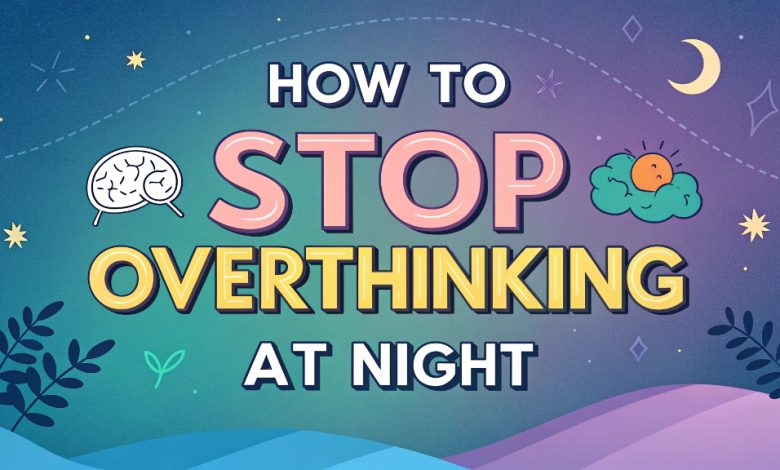How to Stop Overthinking at Night: A Comprehensive Guide

Overthinking at night, often described as a racing mind or incessant mental chatter, is a common issue that disrupts sleep and mental well-being. As the world quiets down, the mind can paradoxically become louder, replaying events, worrying about the future, or dwelling on uncertainties. This 3500-word article explores the history, science, and practical strategies to stop overthinking at night, offering actionable insights for both novices and those familiar with the topic. From cognitive techniques to lifestyle changes, we’ll cover the benefits, challenges, and future trends in managing nocturnal overthinking, ensuring you can reclaim restful nights.
History of Overthinking and Sleep Disturbances

Early Understandings of Overthinking
-
Ancient Philosophy: Greek philosophers like Aristotle noted the mind’s tendency to ruminate, linking it to sleeplessness. They viewed excessive thought as a disruption of balance.
-
Traditional Medicine: In ancient Chinese and Ayurvedic practices, overthinking was tied to imbalances in energy (Qi or Doshas), with herbal remedies and meditation prescribed to calm the mind.
-
Medieval Period: Sleep disturbances were often attributed to spiritual or demonic influences, with prayer or rituals used to quiet the mind.
Evolution of Psychological Perspectives
-
19th Century: The advent of psychology brought focus to “neurasthenia,” a condition encompassing overthinking and insomnia, treated with rest cures.
-
20th Century: Freud’s psychoanalysis linked rumination to unresolved conflicts, while behaviorists explored conditioned thought patterns.
-
Modern Era: Cognitive Behavioral Therapy (CBT) emerged in the 1960s, revolutionizing treatment by targeting thought patterns directly, with CBT for Insomnia (CBT-I) becoming a gold standard.
Current State
-
Prevalence: Studies estimate 30-40% of adults experience occasional nighttime overthinking, with 10-15% facing chronic issues.
-
Research: Neuroimaging reveals overactivity in the amygdala and prefrontal cortex during rumination, linking it to stress and poor sleep.
-
Cultural Factors: The rise of digital devices and 24/7 connectivity has exacerbated nocturnal overthinking, with blue light and information overload disrupting circadian rhythms.
Key Concepts of OverThinking at Night
What is Overthinking?
-
Definition: Overthinking involves repetitive, unproductive thoughts that are difficult to control, often focusing on worries, regrets, or hypothetical scenarios.
-
Nighttime Specificity: The absence of distractions at night amplifies overthinking, as the brain processes the day’s events or anticipates future challenges.
Neurological and Psychological Mechanisms
-
Default Mode Network (DMN): The DMN, active during rest, drives self-referential thoughts, which can spiral into rumination without external stimuli.
-
Stress Response: Cortisol spikes from stress keep the brain in a hyper-alert state, making it harder to disengage from thoughts.
-
Cognitive Distortions: Common distortions like catastrophizing or overgeneralization fuel nighttime worry loops.
Types of Nighttime Overthinking
-
Retrospective: Replaying past events, such as conversations or mistakes.
-
Prospective: Worrying about future uncertainties, like work or relationships.
-
Existential: Questioning life’s purpose or mortality, often triggered by quiet moments.
Benefits of Addressing Nighttime Overthinking
Improved Sleep Quality
-
Restorative Sleep: Reducing overthinking enhances deep sleep stages, critical for memory consolidation and emotional regulation.
-
Reduced Sleep Latency: Falling asleep faster minimizes frustration and reinforces healthy sleep habits.
Enhanced Mental Health
-
Lower Anxiety: Breaking worry cycles reduces generalized anxiety and panic symptoms.
-
Mood Stability: Better sleep stabilizes mood, decreasing irritability and depressive tendencies.
Cognitive and Physical Benefits
-
Improved Focus: A rested mind enhances concentration and decision-making.
-
Physical Health: Quality sleep lowers risks of obesity, heart disease, and immune dysfunction linked to chronic insomnia.
Challenges in Managing Nighttime Overthinking
Internal Barriers
-
Habitual Thought Patterns: Long-standing rumination can feel automatic, resisting change.
-
Emotional Triggers: Unresolved trauma or stress can perpetuate overthinking, requiring deeper therapeutic work.
External Barriers
-
Lifestyle Factors: Irregular schedules, caffeine, or screen time disrupt sleep hygiene, exacerbating overthinking.
-
Social Pressures: Work demands or social media comparisons can fuel nighttime worry.
Treatment Resistance
-
Individual Differences: Not all strategies work universally; some may need tailored approaches.
-
Access to Resources: Therapy or sleep clinics may be costly or inaccessible for some.
Practical Strategies to Stop Overthinking at Night
Cognitive Behavioral Techniques
-
Thought Stopping:
-
Identify intrusive thoughts and mentally say “Stop.”
-
Redirect focus to a neutral image, like a calm beach.
-
-
Cognitive Restructuring:
-
Challenge distortions by asking, “Is this thought factual or exaggerated?”
-
Replace negative thoughts with balanced alternatives.
-
-
Worry Time:
-
Schedule 15-20 minutes during the day to process worries.
-
Postpone nighttime thoughts to this designated period.
-
Mindfulness and Relaxation Practices
-
Mindfulness Meditation:
-
Practice 10-15 minutes of guided meditation before bed.
-
Focus on breath or body sensations to anchor the mind.
-
-
Progressive Muscle Relaxation (PMR):
-
Tense and release muscle groups sequentially to reduce physical tension.
-
Combine with deep breathing for enhanced calm.
-
-
Visualization:
-
Imagine a peaceful scene, engaging all senses to distract from worries.
-
Sleep Hygiene Improvements
-
Consistent Schedule:
-
Go to bed and wake up at the same time daily, even on weekends.
-
Aim for 7-9 hours of sleep based on individual needs.
-
-
Bedroom Environment:
-
Keep the room dark, quiet, and cool (60-67°F).
-
Use blackout curtains or white noise machines if needed.
-
-
Pre-Bed Routine:
-
Avoid screens 1-2 hours before bed to reduce blue light exposure.
-
Engage in calming activities like reading or journaling.
-
Lifestyle Adjustments
-
Physical Activity:
-
Exercise 30 minutes daily, preferably in the morning or early afternoon.
-
Avoid vigorous workouts within 3 hours of bedtime.
-
-
Dietary Choices:
-
Limit caffeine and alcohol, especially after 2 PM.
-
Opt for light, balanced dinners to prevent digestive discomfort.
-
-
Social Connection:
-
Share concerns with a trusted friend to externalize worries.
-
Avoid heavy discussions close to bedtime.
-
Technology and Tools
-
Sleep Apps:
-
Use apps like Calm or Headspace for guided relaxation.
-
Track sleep patterns with devices like Fitbit for insights.
-
-
Journaling Tools:
-
Try bullet journaling to offload thoughts before bed.
-
Use apps like Day One for digital journaling.
-
-
White Noise Machines:
-
Choose devices with customizable soundscapes for relaxation.
-
Professional Interventions
-
CBT-I:
-
Work with a therapist to address sleep-specific thought patterns.
-
Typically involves 6-8 sessions for lasting results.
-
-
Medication:
-
Consider short-term use of sleep aids under medical supervision.
-
Explore non-benzodiazepine options to minimize dependency.
-
-
Biofeedback:
-
Use devices to monitor heart rate variability and train relaxation.
-
Often paired with therapy for comprehensive results.
-
Comparison Table: Strategies for Stopping Overthinking
|
Strategy |
Time Commitment |
Cost |
Effectiveness |
Best For |
|---|---|---|---|---|
|
Cognitive Behavioral |
15-30 min/day |
Low (self-guided) |
High |
Chronic overthinkers |
|
Mindfulness Meditation |
10-20 min/day |
Low-Free |
Moderate-High |
Stress-related rumination |
|
Sleep Hygiene |
Ongoing |
Low |
High |
General sleep improvement |
|
Exercise |
30 min/day |
Low-Free |
Moderate |
Physical tension relief |
|
Professional Therapy (CBT-I) |
6-8 weeks |
High |
Very High |
Severe, persistent issues |
Future Trends in Managing Nighttime Overthinking
Technological Innovations
-
AI-Powered Sleep Coaches: AI apps will offer personalized sleep plans based on real-time data from wearables, predicting and preventing overthinking episodes.
-
Virtual Reality (VR) Therapy: VR environments will simulate calming scenarios, enhancing mindfulness and distraction techniques.
-
Neurofeedback Devices: Wearable devices will train users to regulate brain activity, reducing DMN overactivity.
Integrative Approaches
-
Holistic Programs: Combining CBT, yoga, and nutrition will become standard in sleep clinics, addressing mind-body connections.
-
Personalized Medicine: Genetic profiling may guide tailored interventions, identifying optimal medications or supplements.
Cultural Shifts
-
Workplace Wellness: Companies will prioritize sleep health, offering nap rooms or flexible schedules to reduce stress-driven overthinking.
-
Digital Detox Movements: Growing awareness of screen time’s impact will spur “unplugged” evenings, promoting mental quietude.
Review
This article provides a thorough exploration of nighttime overthinking, blending historical context, scientific insights, and practical strategies. Its strength lies in its comprehensive approach, covering cognitive, lifestyle, and technological interventions with clear, actionable steps. The inclusion of a comparison table enhances usability, while the FAQ section addresses common concerns concisely. However, the article could deepen its discussion of cultural differences in overthinking triggers, as these vary globally. Overall, it’s a valuable resource for anyone seeking to quiet their mind and improve sleep quality.
Read More Also: Rewiring Your Brain for Positivity: A Practical Guide to Improve Your Thinking Skills
FAQs
What causes overthinking at night?
Overthinking at night is often triggered by stress, anxiety, or an overactive Default Mode Network, amplified by a lack of daytime distractions.
How long does it take to stop overthinking at night?
With consistent practice, cognitive and mindfulness techniques can show results in 2-4 weeks, though severe cases may require longer.
Can overthinking at night affect physical health?
Yes, chronic overthinking disrupts sleep, increasing risks of heart disease, obesity, and weakened immunity.
Are there quick fixes for nighttime overthinking?
Quick strategies like deep breathing or journaling can help, but lasting change requires consistent habits like CBT or sleep hygiene.
When should I seek professional help?
If overthinking persists for over a month or severely impacts sleep and daily life, consult a therapist or sleep specialist.
Conclusion
Stopping overthinking at night is a multifaceted challenge requiring a blend of cognitive, lifestyle, and sometimes professional interventions. By understanding its roots, applying evidence-based strategies, and embracing emerging trends, you can quiet your mind and restore restful sleep. Start with small, consistent steps—whether journaling, meditating, or optimizing your sleep environment—and build a routine that works for you. With persistence, the cycle of nocturnal rumination can be broken, paving the way for clearer days and calmer nights.




